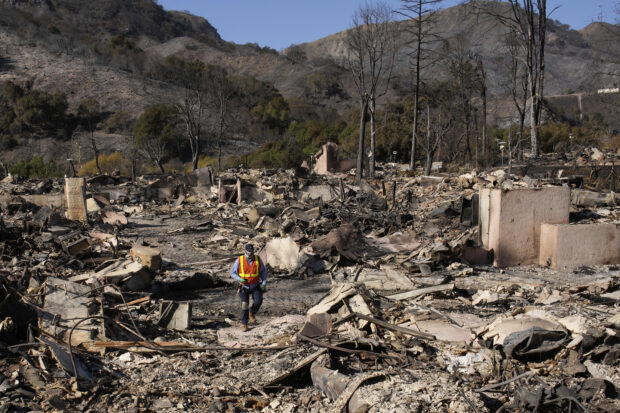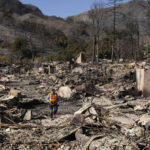California Insurance Commissioner Ricardo Lara is asking all California insurance companies to provide advance payments on claims for Los Angeles wildfire survivors.
Lara’s Jan. 23 order is designed to help speed the recovery process for wildfire survivors affected by several fires in Southern California, including the deadly Palisades and Eaton fires around Los Angeles.
Insured loss estimates from the two fires are—which, at their height, burned along with three other large and destructive Los Angeles area wildfires—continue to rise. Moody’s Ratings said in a report on Thursday that it expects the Los Angeles wildfires to increase property insurance costs across California.
Preliminary estimates from Moody’s RMS are for insured property losses to be as much as $30 billion from the fires. Catastrophe modeler KCC said on Thursday that insured loss from privately insured and California FAIR plan policies to residential, commercial and industrial properties, and autos from the Palisades and Eaton Fires will be close to $28 billion.
Estimates issued by Verisk earlier last week pegged insured losses to property from the Palisades and Eaton fires between $28 billion and $35 billion, including losses to the California FAIR Plan. CoreLogic indicated a $35 to $45 billion range of insured losses for two major fires in Los Angeles.
The fires and emergency declarations by the state’s governor prompted Lara to issue several moratoriums on cancellations and non-renewals.
Lara earlier this month expanded emergency insurance protections for Southern California homeowners, adding new ZIP Codes to those already under a mandatory one-year moratorium on insurance non-renewals and cancellations. The expanded order shields those within the perimeters or adjoining ZIP Codes of the Palisades, Eaton, Hurst, Lidia, Sunset and Woodley fires in Los Angeles County for one year from the Gov. Gavin Newsom’s Jan. 7 emergency declaration regardless of whether they suffered a loss.
Laws that came out following the 2018 wildfires mandate that policyholders who suffered a total loss in the Southern California wildfire emergency are entitled to advance payments on their claims.
Many people have already received upfront payments for personal contents and additional living expenses, with some companies paying more than the law requires, according to the California Department of Insurance. However, based on feedback the CDI has been receiving in recent days, some insurers and their adjusters that are not adhering to all of these important consumer protection laws, according to the department.
Once a state of emergency has been declared and a property is determined be a total loss, California insurance law requires certain advance payments to claimants which include:
- Existing law requires insurers to advance funds for replacing personal property or contents in an amount that is 30 percent of the policy’s dwelling limit, up to $250,000, without requiring the policyholder to file an itemized claim. Insurers are required to automatically notify policyholders of this option upfront. After receiving the advance payment for contents, the policyholder can recover the full value of their destroyed personal property, up to their policy limits, by complying with documentation requirements.
- Existing law requires insurers to provide their policyholders with an advance payment of no less than four months of additional living expenses. This also applies to California FAIR Plan policies, which use the term “FAIR Rental Value” instead of ALE.
Lara’s Bulletin also clarifies consumer rights to rebuild or purchase a property at another location. Commissioner Lara pushed for this change in 2020 after learning some insurance companies deducted benefits for people who purchased a home in a new location. Under the law that he sponsored, policyholders are due the full benefits whether they rebuild or move to a new location, including payment of replacement cost and building code upgrade benefits. And current law prohibits deductions for the value of land at the new location from the measure of damages.
Lara in a bulletin to insurers asking all insurers to provide advance payments on claims for wildfire survivors further detailed existing consumer protections under state law following a state of emergency for those experiencing a total loss, including:
- The law gives people a minimum of 36 months from the date that the first payment is made to collect the full replacement cost of the loss, subject to the policy limits. Additional extensions of six months must be provided to policyholders for good cause.
- A residential property insured is allowed to combine payments for claims for losses up to the policy limits for the primary dwelling and other structures, if the policy limits for coverage to rebuild or replace the primary dwelling are insufficient.
- The law gives people 36 months plus six-month extensions for good cause, which includes delays in the reconstruction process beyond someone’s control. Additional extensions of six months must be provided to policyholders for good cause.
- After a total loss, an insurer must offer to renew the policy for at least the next two renewal periods (for no less than 24 months). Those with a partial loss or no loss who are within the areas protected by the commissioner’s moratorium are protected for one year from Jan. 7, the date of the Newsom’s emergency declaration.
This article was previously published by Insurance Journal.
Featured image: A worker surveys the damage from the Palisades Fire in the Pacific Palisades neighborhood of Los Angeles, Monday, Jan. 13, 2025. (AP Photo/John Locher, File)





















 Allianz Built an AI Agent to Train Claims Professionals in Virtual Reality
Allianz Built an AI Agent to Train Claims Professionals in Virtual Reality  Retired NASCAR Driver Greg Biffle Wasn’t Piloting Plane Before Deadly Crash
Retired NASCAR Driver Greg Biffle Wasn’t Piloting Plane Before Deadly Crash  Flood Risk Misconceptions Drive Underinsurance: Chubb
Flood Risk Misconceptions Drive Underinsurance: Chubb  Experts Say It’s Difficult to Tie AI to Layoffs
Experts Say It’s Difficult to Tie AI to Layoffs 





